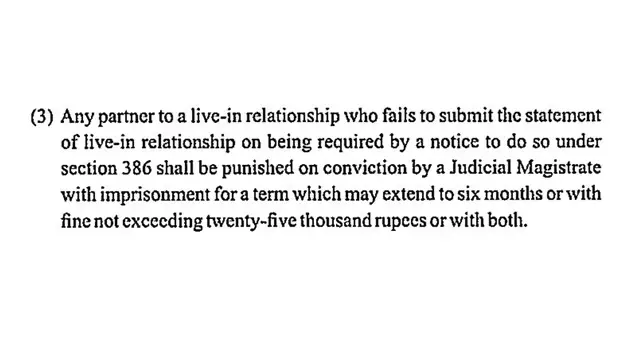In an unprecedented step, the Uttarakhand government has presented a bill in the State assembly aimed at regulating live-in relationships.
Notably, the proposed Uniform Civil Code (UCC) Bill entails penalties, including imprisonment, for individuals who fail to officially register their live-in relationships. Additionally, the draft legislation addresses various other matters such as marriage, divorce, and inheritance within Uttarakhand.
Chief Minister Pushkar Singh Dhami introduced the Bill, stating on X,
With the aim of giving equal rights to the citizens of Devbhoomi Uttarakhand, a Uniform Civil Code bill will be introduced in the Assembly today. It is a moment of pride for all the people of the state that we will be known as the first state in the country to move towards implementing UCC (sic).
The UCC Uttarakhand has been formulated following discussions by a five-member committee led by former Supreme Court judge Justice Ranjana Prakash Desai. The committee presented its final report on the UCC to Dhami on February 2.
The objective of the UCC is to consolidate different aspects of civil life under a unified law, outlining permissible and prohibited actions in relationships across different faiths, while considering personal customary laws.
Law governing live-in relationships
Those intending to cohabit as partners in live-in arrangements in Uttarakhand will now be required to formalize their unions by submitting a statement to the Registrar. However, the Registrar holds discretion in deciding whether to approve the registration, considering whether the relationship complies with the conditions outlined in the UCC.
A live-in relationship will not be registered if the partners fall into the category of “prohibited relationships,” as specified by the UCC.
The UCC provides a list of relationships that are deemed prohibited. Importantly, these restrictions do not apply to individuals whose customs allow such relationships, provided these customs do not conflict with public policy or morality.
The Code defines a live-in relationship as a cohabitation arrangement between “a man and woman” residing in the same household akin to marriage.

Upon receipt of a statement from individuals intending to engage in a live-in relationship, the Registrar will initiate an inquiry and make a determination regarding registration within 30 days of receiving the couple’s statement.
As outlined in Section 385 of the proposed Bill, a statement submitted to the Registrar will be transmitted to the officer-in-charge of the local police station for record-keeping purposes.
Furthermore, if either of the partners is under 21 years of age, it is mandated that this information be communicated to their parents or guardians.
Can couples be jailed?
Certainly, failure to notify the authorities and submit their statement by those intending to cohabit may lead to consequences. They will be issued a notice, following which criminal prosecution may be initiated against them.
The UCC Bill delineates three categories of penalties in the event that couples fail to adhere to the law.
In the first instance, if they spend a month without submitting a statement, they could be subject to imprisonment for up to three months or a maximum fine of ₹10,000, or both.
Any false statement made by the couple could result in the same imprisonment term, but with a higher fine amount of ₹25,000, or both.
Upon receiving a notice from the Registrar, failure by a partner to submit the statement regarding the live-in relationship may result in a six-month imprisonment term and/or a fine of ₹25,000.

According to Advocate Utkarsh Singh, who has represented such couples in legal proceedings, the Code appears to be a move in the right direction but also a regression in some aspects.
The entire purpose of a live-in relationship is to explore living with another person without any statutory obligation. The idea of getting it registered will only deter the consenting individuals for any partnership and envisaging of penalties and punishment under the Code will not only discourage consenting individuals but it is also anathema to free volition,
With the introduction of this Bill, the discussion regarding the applicability of a Uniform Civil Code throughout the nation has once again become significant.
Last year, the 22nd Law Commission solicited opinions and recommendations from the public, recognized religious bodies, and other concerned parties regarding the UCC.
In response, Senior Advocate and DMK Rajya Sabha MP P Wilson wrote to the Commission expressing concerns that the UCC might erode the distinct traditions and cultures of minority communities and posed a threat to secularism.
Similarly, Jamiat Ulama-i-Hind contended that the implementation of the UCC could impact the rights of individuals and religious groups under Articles 25 and 26 of the Indian Constitution.
A mandatory uniform code will be a blanket imposition of one identity on a country whose inhabitants bear diverse identities,
On the contrary, the Central government has expressed support for implementing the Code but emphasized the need for a comprehensive examination of the provisions of different personal laws that regulate various communities.
Currently, Uttarakhand is poised to become the first state to enact a uniform code governing the lives of its residents. Notably, the governing party’s vision appears to be materializing gradually, starting with individual states.
While the State government appears to be delivering on its election promise ahead of the 2022 assembly polls, critics argue that its implementation could undermine the diversity of Uttarakhand.













